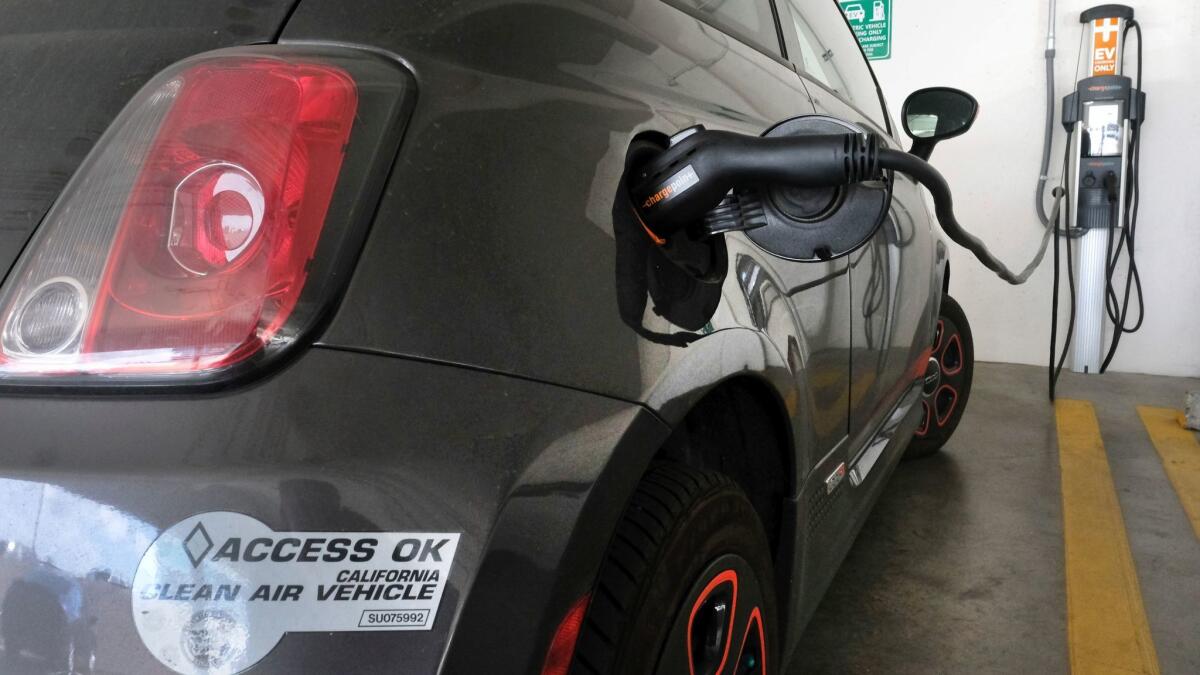Funding for $3-billion electric car rebate bill is up in the air

- Share via
Reporting from San Francisco — The California state Legislature will decide Friday whether to go forward with a $3-billion plan to increase electric vehicle rebates far beyond the current rate of $2,500 per car, even as the source of funding remains in question.
The bill, AB-1184, had called for a guaranteed $500 million a year from state coffers, but recent amendments avoid the issue altogether by pushing money decisions into the future. It now says the “intent” of the Legislature is to “supplement current funding levels” from a “portfolio of funding resources.” Details are left vague.
Another amendment, however, explicitly bars the use of utility ratepayer increases to fund vehicle rebates under the program.
When the bill was first introduced earlier this year, the idea of charging utility customers extra on their bills to help pay for the program had been debated. Several legislators, including Sen. Steven Bradford (D-Gardena), had made clear that such funding was unacceptable.
The Senate Appropriations Committee will hold a hearing on the bill Friday morning. By the end of the day, legislative leaders will decide whether to send it to the full Legislature for approval.
If the bill is green-lighted by the end of the session on Sept. 15 and signed by the governor, the California Air Resources Board would be responsible for crafting the rebate plan by September 2018. Funding must be approved by the Legislature.
The bill aims to reduce greenhouse gases and toxic air pollution by putting a lot more electric-powered vehicles on the road. Only 315,000 plug-in hybrid and pure electric cars are registered in California now. The state wants at least 1.5 million of them by 2025.
Bill sponsor Assemblyman Phil Ting (D-San Francisco) said the state’s current $2,500 rebate plan still leaves a wide gap in prices between electric and internal combustion cars.
The goal, he said, is to “bring the price down to the equivalent of what a comparable gasoline car would be so that if people really want electric, price is no longer the option. By doing that we think we can begin to move these cars very quickly.”
State Senate colleague and bill advocate Henry Stern (D-Canoga Park) said, “California consumes more petroleum than any nation on the planet besides the U.S. and China. That’s why we’re talking about the scale we are.”
Stern also sees the bill as a way to save money for the middle class. “People are filling up at half the price as at the pump,” he said. Making electric cars more affordable “makes more money available for child care and healthcare and everything else they have to deal with.”
Analysts expect electric cars to become price-competitive with gasoline- and diesel-powered cars by the middle of the next decade.
Ting’s rebate plan would start rebate amounts high and reduce them in steps as volume grows. A benchmark rebate amount would be set by the air board that would put a compact electric car on the same price level as an equivalent gas or diesel car. That amount, however, would apply to all electric cars whether it’s a $100,000-plus luxury Tesla Model X or a $37,000 Chevy Bolt EV.
The initial amounts could easily exceed $10,000, according to the rough formula put forward in the legislation, to be refined later by the air board.
If the bill passes, rebate supporters will duke it out with champions of other state programs for funding. Ting said the state’s cap-and-trade auction system is the most likely money source, but auction revenue is already spoken for by other environmental programs.
Another amendment aims to take some of the financial sting out by extending the $3-billion program from 2025 to 2030.
Ting has even suggested that some kind of bond offering might be considered, but without details.
Besides the electric car rebate legislation, lawmakers on Friday will be deciding whether to push several other related bills forward. Among those they are considering are bills that would:
- Offer rebates on purchases of used zero-emission vehicles.
- Tighten emission testing in the wake of the Volkswagen diesel cheating scandal.
- Mandate that state government purchases of electric heavy-duty trucks hit 15% by 2025 and 30% by 2030.
- Promote electric vehicle charging stations at schools and in state parks.
- Authorize a study of state building codes to require electric vehicle charging capability.
- Reduce freeway red light violations from $100 to $35.
Twitter: @russ1mitchell
ALSO
Uber says it’ll stop tracking riders after they’re dropped off
Volkswagen engineer gets prison term and $200,000 fine in emissions-cheating case
California’s goal: an electricity grid moving only clean energy







